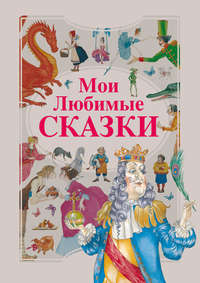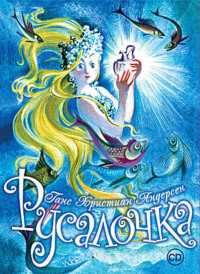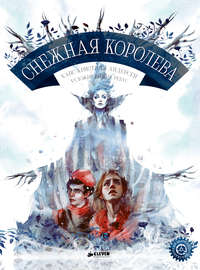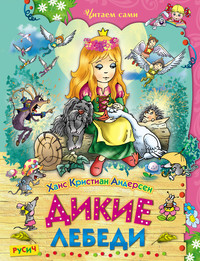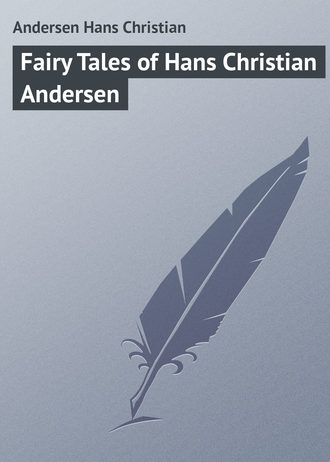 полная версия
полная версияFairy Tales of Hans Christian Andersen
Long days and months rolled by, during which the bottle stood empty in a corner, when a storm arose – whether on the passage out or home it could not tell, for it had never been ashore. It was a terrible storm, great waves arose, darkly heaving and tossing the vessel to and fro. The main mast was split asunder, the ship sprang a leak, and the pumps became useless, while all around was black as night. At the last moment, when the ship was sinking, the young mate wrote on a piece of paper, "We are going down: God's will be done." Then he wrote the name of his betrothed, his own name, and that of the ship. Then he put the leaf in an empty bottle that happened to be at hand, corked it down tightly, and threw it into the foaming sea. He knew not that it was the very same bottle from which the goblet of joy and hope had once been filled for him, and now it was tossing on the waves with his last greeting, and a message from the dead. The ship sank, and the crew sank with her; but the bottle flew on like a bird, for it bore within it a loving letter from a loving heart. And as the sun rose and set, the bottle felt as at the time of its first existence, when in the heated glowing stove it had a longing to fly away. It outlived the storms and the calm, it struck against no rocks, was not devoured by sharks, but drifted on for more than a year, sometimes towards the north, sometimes towards the south, just as the current carried it. It was in all other ways its own master, but even of that one may get tired. The written leaf, the last farewell of the bridegroom to his bride, would only bring sorrow when once it reached her hands; but where were those hands, so soft and delicate, which had once spread the table-cloth on the fresh grass in the green wood, on the day of her betrothal? Ah, yes! where was the furrier's daughter? and where was the land which might lie nearest to her home?
The bottle knew not, it travelled onward and onward, and at last all this wandering about became wearisome; at all events it was not its usual occupation. But it had to travel, till at length it reached land – a foreign country. Not a word spoken in this country could the bottle understand; it was a language it had never before heard, and it is a great loss not to be able to understand a language. The bottle was fished out of the water, and examined on all sides. The little letter contained within it was discovered, taken out, and turned and twisted in every direction; but the people could not understand what was written upon it. They could be quite sure that the bottle had been thrown overboard from a vessel, and that something about it was written on this paper: but what was written? that was the question, – so the paper was put back into the bottle, and then both were put away in a large cupboard of one of the great houses of the town. Whenever any strangers arrived, the paper was taken out and turned over and over, so that the address, which was only written in pencil, became almost illegible, and at last no one could distinguish any letters on it at all. For a whole year the bottle remained standing in the cupboard, and then it was taken up to the loft, where it soon became covered with dust and cobwebs. Ah! how often then it thought of those better days – of the times when in the fresh, green wood, it had poured forth rich wine; or, while rocked by the swelling waves, it had carried in its bosom a secret, a letter, a last parting sigh. For full twenty years it stood in the loft, and it might have stayed there longer but that the house was going to be rebuilt. The bottle was discovered when the roof was taken off; they talked about it, but the bottle did not understand what they said – a language is not to be learnt by living in a loft, even for twenty years. "If I had been down stairs in the room," thought the bottle, "I might have learnt it." It was now washed and rinsed, which process was really quite necessary, and afterwards it looked clean and transparent, and felt young again in its old age; but the paper which it had carried so faithfully was destroyed in the washing. They filled the bottle with seeds, though it scarcely knew what had been placed in it. Then they corked it down tightly, and carefully wrapped it up. There not even the light of a torch or lantern could reach it, much less the brightness of the sun or moon. "And yet," thought the bottle, "men go on a journey that they may see as much as possible, and I can see nothing." However, it did something quite as important; it travelled to the place of its destination, and was unpacked.
"What trouble they have taken with that bottle over yonder!" said one, "and very likely it is broken after all." But the bottle was not broken, and, better still, it understood every word that was said: this language it had heard at the furnaces and at the wine merchant's; in the forest and on the ship, – it was the only good old language it could understand. It had returned home, and the language was as a welcome greeting. For very joy, it felt ready to jump out of people's hands, and scarcely noticed that its cork had been drawn, and its contents emptied out, till it found itself carried to a cellar, to be left there and forgotten. "There's no place like home, even if it's a cellar." It never occurred to him to think that he might lie there for years, he felt so comfortable. For many long years he remained in the cellar, till at last some people came to carry away the bottles, and ours amongst the number.
Out in the garden there was a great festival. Brilliant lamps hung in festoons from tree to tree; and paper lanterns, through which the light shone till they looked like transparent tulips. It was a beautiful evening, and the weather mild and clear. The stars twinkled; and the new moon, in the form of a crescent, was surrounded by the shadowy disc of the whole moon, and looked like a gray globe with a golden rim: it was a beautiful sight for those who had good eyes. The illumination extended even to the most retired of the garden walks, at least not so retired that any one need lose himself there. In the borders were placed bottles, each containing a light, and among them the bottle with which we are acquainted, and whose fate it was, one day, to be only a bottle neck, and to serve as a water-glass to a bird's-cage. Everything here appeared lovely to our bottle, for it was again in the green wood, amid joy and feasting; again it heard music and song, and the noise and murmur of a crowd, especially in that part of the garden where the lamps blazed, and the paper lanterns displayed their brilliant colors. It stood in a distant walk certainly, but a place pleasant for contemplation; and it carried a light; and was at once useful and ornamental. In such an hour it is easy to forget that one has spent twenty years in a loft, and a good thing it is to be able to do so. Close before the bottle passed a single pair, like the bridal pair – the mate and the furrier's daughter – who had so long ago wandered in the wood. It seemed to the bottle as if he were living that time over again. Not only the guests but other people were walking in the garden, who were allowed to witness the splendor and the festivities. Among the latter came an old maid, who seemed to be quite alone in the world. She was thinking, like the bottle, of the green wood, and of a young betrothed pair, who were closely connected with herself; she was thinking of that hour, the happiest of her life, in which she had taken part, when she had herself been one of that betrothed pair; such hours are never to be forgotten, let a maiden be as old as she may. But she did not recognize the bottle, neither did the bottle notice the old maid. And so we often pass each other in the world when we meet, as did these two, even while together in the same town.
The bottle was taken from the garden, and again sent to a wine merchant, where it was once more filled with wine, and sold to an aeronaut, who was to make an ascent in his balloon on the following Sunday. A great crowd assembled to witness the sight; military music had been engaged, and many other preparations made. The bottle saw it all from the basket in which he lay close to a live rabbit. The rabbit was quite excited because he knew that he was to be taken up, and let down again in a parachute. The bottle, however, knew nothing of the "up," or the "down;" he saw only that the balloon was swelling larger and larger till it could swell no more, and began to rise and be restless. Then the ropes which held it were cut through, and the aerial ship rose in the air with the aeronaut and the basket containing the bottle and the rabbit, while the music sounded and all the people shouted "Hurrah."
"This is a wonderful journey up into the air," thought the bottle; "it is a new way of sailing, and here, at least, there is no fear of striking against anything."
Thousands of people gazed at the balloon, and the old maid who was in the garden saw it also; for she stood at the open window of the garret, by which hung the cage containing the linnet, who then had no water-glass, but was obliged to be contented with an old cup. In the window-sill stood a myrtle in a pot, and this had been pushed a little on one side, that it might not fall out; for the old maid was leaning out of the window, that she might see. And she did see distinctly the aeronaut in the balloon, and how he let down the rabbit in the parachute, and then drank to the health of all the spectators in the wine from the bottle. After doing this, he hurled it high into the air. How little she thought that this was the very same bottle which her friend had thrown aloft in her honor, on that happy day of rejoicing, in the green wood, in her youthful days. The bottle had no time to think, when raised so suddenly; and before it was aware, it reached the highest point it had ever attained in its life. Steeples and roofs lay far, far beneath it, and the people looked as tiny as possible. Then it began to descend much more rapidly than the rabbit had done, made somersaults in the air, and felt itself quite young and unfettered, although it was half full of wine. But this did not last long. What a journey it was! All the people could see the bottle; for the sun shone upon it. The balloon was already far away, and very soon the bottle was far away also; for it fell upon a roof, and broke in pieces. But the pieces had got such an impetus in them, that they could not stop themselves. They went jumping and rolling about, till at last they fell into the court-yard, and were broken into still smaller pieces; only the neck of the bottle managed to keep whole, and it was broken off as clean as if it had been cut with a diamond.
"That would make a capital bird's glass," said one of the cellar-men; but none of them had either a bird or a cage, and it was not to be expected they would provide one just because they had found a bottle neck that could be used as a glass. But the old maid who lived in the garret had a bird, and it really might be useful to her; so the bottle neck was provided with a cork, and taken up to her; and, as it often happens in life, the part that had been uppermost was now turned downwards, and it was filled with fresh water. Then they hung it in the cage of the little bird, who sang and twittered more merrily than ever.
"Ah, you have good reason to sing," said the bottle neck, which was looked upon as something very remarkable, because it had been in a balloon; nothing further was known of its history. As it hung there in the bird's-cage, it could hear the noise and murmur of the people in the street below, as well as the conversation of the old maid in the room within. An old friend had just come to visit her, and they talked, not about the bottle neck, but of the myrtle in the window.
"No, you must not spend a dollar for your daughter's bridal bouquet," said the old maid; "you shall have a beautiful little bunch for a nosegay, full of blossoms. Do you see how splendidly the tree has grown? It has been raised from only a little sprig of myrtle that you gave me on the day after my betrothal, and from which I was to make my own bridal bouquet when a year had passed: but that day never came; the eyes were closed which were to have been my light and joy through life. In the depths of the sea my beloved sleeps sweetly; the myrtle has become an old tree, and I am a still older woman. Before the sprig you gave me faded, I took a spray, and planted it in the earth; and now, as you see, it has become a large tree, and a bunch of the blossoms shall at last appear at a wedding festival, in the bouquet of your daughter."
There were tears in the eyes of the old maid, as she spoke of the beloved of her youth, and of their betrothal in the wood. Many thoughts came into her mind; but the thought never came, that quite close to her, in that very window, was a remembrance of those olden times, – the neck of the bottle which had, as it were shouted for joy when the cork flew out with a bang on the betrothal day. But the bottle neck did not recognize the old maid; he had not been listening to what she had related, perhaps because he was thinking so much about her.
THE BUCKWHEAT
Very often, after a violent thunder-storm, a field of buckwheat appears blackened and singed, as if a flame of fire had passed over it. The country people say that this appearance is caused by lightning; but I will tell you what the sparrow says, and the sparrow heard it from an old willow-tree which grew near a field of buckwheat, and is there still. It is a large venerable tree, though a little crippled by age. The trunk has been split, and out of the crevice grass and brambles grow. The tree bends for-ward slightly, and the branches hang quite down to the ground just like green hair. Corn grows in the surrounding fields, not only rye and barley, but oats, – pretty oats that, when ripe, look like a number of little golden canary-birds sitting on a bough. The corn has a smiling look and the heaviest and richest ears bend their heads low as if in pious humility. Once there was also a field of buckwheat, and this field was exactly opposite to old willow-tree. The buckwheat did not bend like the other grain, but erected its head proudly and stiffly on the stem. "I am as valuable as any other corn," said he, "and I am much handsomer; my flowers are as beautiful as the bloom of the apple blossom, and it is a pleasure to look at us. Do you know of anything prettier than we are, you old willow-tree?"
And the willow-tree nodded his head, as if he would say, "Indeed I do."
But the buckwheat spread itself out with pride, and said, "Stupid tree; he is so old that grass grows out of his body."
There arose a very terrible storm. All the field-flowers folded their leaves together, or bowed their little heads, while the storm passed over them, but the buckwheat stood erect in its pride. "Bend your head as we do," said the flowers.
"I have no occasion to do so," replied the buckwheat.
"Bend your head as we do," cried the ears of corn; "the angel of the storm is coming; his wings spread from the sky above to the earth beneath. He will strike you down before you can cry for mercy."
"But I will not bend my head," said the buckwheat.
"Close your flowers and bend your leaves," said the old willow-tree. "Do not look at the lightning when the cloud bursts; even men cannot do that. In a flash of lightning heaven opens, and we can look in; but the sight will strike even human beings blind. What then must happen to us, who only grow out of the earth, and are so inferior to them, if we venture to do so?"
"Inferior, indeed!" said the buckwheat. "Now I intend to have a peep into heaven." Proudly and boldly he looked up, while the lightning flashed across the sky as if the whole world were in flames.
When the dreadful storm had passed, the flowers and the corn raised their drooping heads in the pure still air, refreshed by the rain, but the buckwheat lay like a weed in the field, burnt to blackness by the lightning. The branches of the old willow-tree rustled in the wind, and large water-drops fell from his green leaves as if the old willow were weeping. Then the sparrows asked why he was weeping, when all around him seemed so cheerful. "See," they said, "how the sun shines, and the clouds float in the blue sky. Do you not smell the sweet perfume from flower and bush? Wherefore do you weep, old willow-tree?" Then the willow told them of the haughty pride of the buckwheat, and of the punishment which followed in consequence.
This is the story told me by the sparrows one evening when I begged them to relate some tale to me.
THE BUTTERFLY
There was once a butterfly who wished for a bride, and, as may be supposed, he wanted to choose a very pretty one from among the flowers. He glanced, with a very critical eye, at all the flower-beds, and found that the flowers were seated quietly and demurely on their stalks, just as maidens should sit before they are engaged; but there was a great number of them, and it appeared as if his search would become very wearisome. The butterfly did not like to take too much trouble, so he flew off on a visit to the daisies. The French call this flower "Marguerite," and they say that the little daisy can prophesy. Lovers pluck off the leaves, and as they pluck each leaf, they ask a question about their lovers; thus: "Does he or she love me? – Ardently? Distractedly? Very much? A little? Not at all?" and so on. Every one speaks these words in his own language. The butterfly came also to Marguerite to inquire, but he did not pluck off her leaves; he pressed a kiss on each of them, for he thought there was always more to be done by kindness.
"Darling Marguerite daisy," he said to her, "you are the wisest woman of all the flowers. Pray tell me which of the flowers I shall choose for my wife. Which will be my bride? When I know, I will fly directly to her, and propose."
But Marguerite did not answer him; she was offended that he should call her a woman when she was only a girl; and there is a great difference. He asked her a second time, and then a third; but she remained dumb, and answered not a word. Then he would wait no longer, but flew away, to commence his wooing at once. It was in the early spring, when the crocus and the snowdrop were in full bloom.
"They are very pretty," thought the butterfly; "charming little lasses; but they are rather formal."
Then, as the young lads often do, he looked out for the elder girls. He next flew to the anemones; these were rather sour to his taste. The violet, a little too sentimental. The lime-blossoms, too small, and besides, there was such a large family of them. The apple-blossoms, though they looked like roses, bloomed to-day, but might fall off to-morrow, with the first wind that blew; and he thought that a marriage with one of them might last too short a time. The pea-blossom pleased him most of all; she was white and red, graceful and slender, and belonged to those domestic maidens who have a pretty appearance, and can yet be useful in the kitchen. He was just about to make her an offer, when, close by the maiden, he saw a pod, with a withered flower hanging at the end.
"Who is that?" he asked.
"That is my sister," replied the pea-blossom.
"Oh, indeed; and you will be like her some day," said he; and he flew away directly, for he felt quite shocked.
A honeysuckle hung forth from the hedge, in full bloom; but there were so many girls like her, with long faces and sallow complexions. No; he did not like her. But which one did he like?
Spring went by, and summer drew towards its close; autumn came; but he had not decided. The flowers now appeared in their most gorgeous robes, but all in vain; they had not the fresh, fragrant air of youth. For the heart asks for fragrance, even when it is no longer young; and there is very little of that to be found in the dahlias or the dry chrysanthemums; therefore the butterfly turned to the mint on the ground. You know, this plant has no blossom; but it is sweetness all over, – full of fragrance from head to foot, with the scent of a flower in every leaf.
"I will take her," said the butterfly; and he made her an offer. But the mint stood silent and stiff, as she listened to him. At last she said, —
"Friendship, if you please; nothing more. I am old, and you are old, but we may live for each other just the same; as to marrying – no; don't let us appear ridiculous at our age."
And so it happened that the butterfly got no wife at all. He had been too long choosing, which is always a bad plan. And the butterfly became what is called an old bachelor.
It was late in the autumn, with rainy and cloudy weather. The cold wind blew over the bowed backs of the willows, so that they creaked again. It was not the weather for flying about in summer clothes; but fortunately the butterfly was not out in it. He had got a shelter by chance. It was in a room heated by a stove, and as warm as summer. He could exist here, he said, well enough.
"But it is not enough merely to exist," said he, "I need freedom, sunshine, and a little flower for a companion."
Then he flew against the window-pane, and was seen and admired by those in the room, who caught him, and stuck him on a pin, in a box of curiosities. They could not do more for him.
"Now I am perched on a stalk, like the flowers," said the butterfly. "It is not very pleasant, certainly; I should imagine it is something like being married; for here I am stuck fast." And with this thought he consoled himself a little.
"That seems very poor consolation," said one of the plants in the room, that grew in a pot.
"Ah," thought the butterfly, "one can't very well trust these plants in pots; they have too much to do with mankind."
A CHEERFUL TEMPER
From my father I received the best inheritance, namely a "good temper." "And who was my father?" That has nothing to do with the good temper; but I will say he was lively, good-looking round, and fat; he was both in appearance and character a complete contradiction to his profession. "And pray what was his profession and his standing in respectable society?" Well, perhaps, if in the beginning of a book these were written and printed, many, when they read it, would lay the book down and say, "It seems to me a very miserable title, I don't like things of this sort." And yet my father was not a skin-dresser nor an executioner; on the contrary, his employment placed him at the head of the grandest people of the town, and it was his place by right. He had to precede the bishop, and even the princes of the blood; he always went first, – he was a hearse driver! There, now, the truth is out. And I will own, that when people saw my father perched up in front of the omnibus of death, dressed in his long, wide, black cloak, and his black-edged, three-cornered hat on his head, and then glanced at his round, jocund face, round as the sun, they could not think much of sorrow or the grave. That face said, "It is nothing, it will all end better than people think." So I have inherited from him, not only my good temper, but a habit of going often to the churchyard, which is good, when done in a proper humor; and then also I take in the Intelligencer, just as he used to do.
I am not very young, I have neither wife nor children, nor a library, but, as I said, I read the Intelligencer, which is enough for me; it is to me a delightful paper, and so it was to my father. It is of great use, for it contains all that a man requires to know; the names of the preachers at the church, and the new books which are published; where houses, servants, clothes, and provisions may be obtained. And then what a number of subscriptions to charities, and what innocent verses! Persons seeking interviews and engagements, all so plainly and naturally stated. Certainly, a man who takes in the Intelligencer may live merrily and be buried contentedly, and by the end of his life will have such a capital stock of paper that he can lie on a soft bed of it, unless he prefers wood shavings for his resting-place. The newspaper and the churchyard were always exciting objects to me. My walks to the latter were like bathing-places to my good humor. Every one can read the newspaper for himself, but come with me to the churchyard while the sun shines and the trees are green, and let us wander among the graves. Each of them is like a closed book, with the back uppermost, on which we can read the title of what the book contains, but nothing more. I had a great deal of information from my father, and I have noticed a great deal myself. I keep it in my diary, in which I write for my own use and pleasure a history of all who lie here, and a few more beside.


